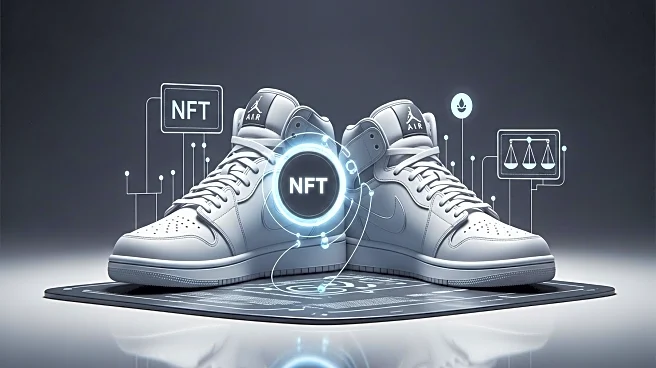What's Happening?
The Nike v. StockX case, which concluded in August 2025 with a confidential settlement, has significantly impacted the legal and commercial framework for NFT-based platforms in the sneaker resale market. The dispute involved allegations of trademark infringement, counterfeit sales, and unauthorized use of NFTs, highlighting tensions between blockchain innovation and traditional intellectual property laws. The case centered on StockX's 'Vault NFTs,' which acted as blockchain-based claim tickets for physical Nike sneakers stored in the platform's vaults. Nike argued these NFTs infringed its trademarks, while StockX defended its use under the first sale doctrine. A March 2025 ruling found StockX liable for selling counterfeit sneakers but denied broader claims, indicating NFTs tied to physical goods could be treated as independent assets.
Why It's Important?
The settlement reflects a judicial trend where courts apply traditional IP doctrines to NFTs, potentially empowering brands to pursue infringement claims against unauthorized NFTs. This case underscores risks for platforms that tokenize branded goods without explicit authorization, as they face heightened litigation risks. The first sale doctrine is less reliable if NFTs are deemed separate assets. Additionally, the case highlights the importance of robust authentication processes to avoid counterfeit liabilities. Regulatory frameworks are evolving, with the U.S. and EU reviewing how NFTs interact with IP law, suggesting a global push to clarify the legal status of NFTs.
What's Next?
NFT-based platforms are recalibrating their business models post-Nike v. StockX. StockX has diversified into categories like gaming systems and watches to mitigate reliance on high-risk assets. Platforms like eBay and GOAT have strengthened authentication processes. Regulatory bodies are reviewing NFT interactions with IP law, and jurisdictional inconsistencies remain a challenge. Investors must weigh the potential of digital assets against litigation risks, counterfeit liabilities, and jurisdictional fragmentation.
Beyond the Headlines
The Nike v. StockX case serves as a catalyst for innovation in the NFT sector, emphasizing the need for platforms to adapt to evolving IP and regulatory standards. The case highlights the blurred line between physical and digital ownership, with winners being those who navigate this complex landscape with foresight and agility.









